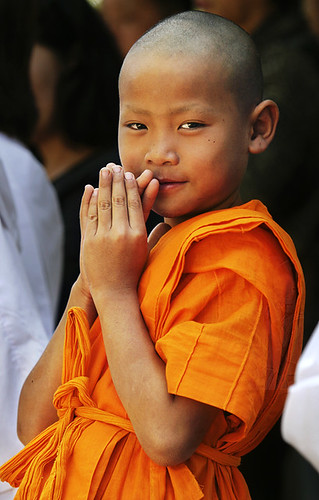Etiquette in Thailand
Thailand is a land of friendliness and hospitality. It is also a land of traditions and customs that differ greatly from those of the Western world. As a foreigner, you might not be expected to effortlessly navigate the complex world of Thai etiquette.
However, having a basic understanding of what is acceptable, what is frowned upon, and what is outright taboo can make a big difference in your social and professional life.
Things to Know about Etiquette in Thailand
As in many Asian cultures, the concept of face plays a large role. Being confrontational, losing your temper, or showing strong negative emotions in public are all considered very negative in Thai culture.
Not only will you lose face and look bad, you will also find that this sort of behavior is not productive in accomplishing what you want to accomplish. Avoid doing anything that may cause you or your Thai friends to lose face.
Thai culture and etiquette in Thailand is strongly hierarchical. Respect must be given to those of higher social status, and to elders. Education, profession, age, and clothing all help to place a person within this hierarchy and to shape the way that that person is treated by others. A person’s social status also determines how they should be greeted.
It is not common to touch someone’s hand when greeting them. The typical Thai greeting is called the Wai, and involves pressing your palms together and bowing your head slightly. Typically, the person of lower status offers the Wai. Thais of very high social status, such as monks, are not expected to return the Wai.
It is considered rude to lie. Even white lies, which are generally more acceptable in Western culture, are taboo. If someone says something to you that seems a bit too direct, don’t take offense—just understand that honesty is the cultural norm in Thailand.
There are also important customs and etiquette surrounding the feet. They are considered to be the lowest and least clean part of the body. You should never show someone the bottoms of your feet, point with your feet, or have your feet higher than the level of someone else’s head.
Finally, the Thai national anthem is played every day at 0800 and 1800 hours. It is considered good etiquette to stop and pay respect at these times.
Do:
- Remove your shoes whenever you enter someone’s home. It’s also a good idea to check when you enter a shop or temple to see if others have removed their shoes.
- Wear modest, neat clothing. Since social status is often determined by clothing, it is important to present a well-groomed and conservative image.
- Address people by their first name. Often, the title Khun is added before the first name. This is similar to Mr. or Mrs., and is used for both men and women, regardless of marital status. Family names are typically only used in formal settings.
- Show respect for the royal family. Stop to pay respect during the National Anthem, and avoid making any negative comments about the king.
- Learn some basic facts about the history of Thailand. Demonstrating some knowledge of the country you’re living in can do a world of good when you are meeting new friends.
Don’t:
- Show someone the bottoms of your feet, or allow your feet to be higher than the level of someone else’s head.
- Touch a monk, especially if you are a woman. Monks are forbidden to have any physical contact with women, and this is strictly observed.
- Touch someone’s head, or pass something over another person’s head.
- Show displays of affection in public. Couples kissing or hugging in public is considered rude and inappropriate.
- Wear short shorts, low-cut tops, or revealing clothes. Generally, bathing suits or other revealing attire are only appropriate on the beach.
Meeting Etiquette in Thailand
You can expect to meet lots of new people and make lots of new friends once you’ve decided to teach English in Thailand.
Thai people are easy-going, and foreigners are quickly forgiven for minor mistakes in etiquette. However, to avoid embarrassing anyone, or causing anyone to lose face, you should have a general idea of what is expected when meeting someone for the first time.
- If you are with a Thai friend or host, wait for them to introduce you.
- Thais typically use first names, with the all-purpose title Khun in front of them.
- To perform the typical Thai greeting, called the Wai, press your palms together at about the level of your chest, and bow slightly.
- When someone offers you a Wai in greeting, it is considered rude not to return it. However, you are not expected to return the Wai to children, waiters, or street vendors.
- It always helps to learn the language in Thailand, even if it’s only a few phrases.
Dining Etiquette in Thailand
The people in Thailand pride themselves on their hospitality. As such, there is a good chance that you will be invited to a meal. Whether this invitation involves going to a nice restaurant or to someone’s home, make sure that you know the basics of dining etiquette before you go.
- Remove your shoes when you enter someone’s home. This also applies to some restaurants, as well.
- Avoid stepping directly on the threshold of someone’s home. Instead, step over the threshold.
- Most Thai food is eaten with a fork and spoon, not with chopsticks.
- Some foods may be eaten with your fingers. Make sure you always use your right hand, though, and never lick your fingers after eating.
- Finishing all of the food on your plate indicates that you are still hungry. It is good etiquette to leave a few bites, to show your host that you are full.
- Seating is often arranged by social hierarchy, so it is best to wait for your host to introduce you and tell you where to sit.
Gift Giving Etiquette in Thailand
Gift giving in Thailand is often informal. Except at weddings or other important events, it is not necessarily expected. However, preparing a simple, neatly-wrapped gift is certainly a worthwhile gesture of friendship and appreciation. If you are going to give a gift to a Thai friend or host, there are a few important things to know:
- Don’t wrap a gift in black, blue, or green. These are the colors used at funerals, and are associated with mourning. Red is an auspicious color for gifts among Chinese Thais.
- It is not common for Thais to open a gift in front of the giver.
- Fruit, flowers, candy or chocolates are always safe choices. You may also give books, liquors, or stationary. Use your best judgment about what your host would find appropriate or useful.
- If you are invited to someone’s home, bringing a gift is not mandatory. However, a small token of gratitude is always appreciated.
Business Etiquette in Thailand
Business culture in Thailand is formal, and very hierarchical. Business relationships form slowly, and it may take a few meetings to build up the trust needed to complete a business transaction. The culture of respect, politeness, and harmony means that you will often have to read between the lines and pay close attention to non-verbal communication to know what is really being said.
-
- Try to make appointments at least a month in advance. Punctuality is especially important in business settings, so arrive a few minutes early to any appointment or meeting.
- Men should wear dark colored business suits. For women, conservative suits, blouses, or business dresses are appropriate.
- Business cards are an important part of business etiquette. If you are given a card, accept it with your right hand, look at it for a few seconds, and place it neatly in your wallet.
- If you are handing out your business card, offer it to the person with the highest social status first.
- Always show respect, humility and good humor, and avoid any displays of negative emotions.





